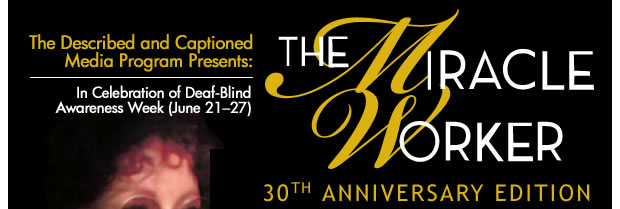Having trouble reading this newsletter?
View our Web version in your browser.








The Miracle Worker: A Perfect Addition to Your Celebration of Deaf-Blind Awareness WeekHelen Keller’s loss of vision and hearing in infancy made comprehension of the outside world next to impossible—or so it seemed. When teacher Anne Sullivan agreed to work with Keller, that world opened up, and they both learned essential life-altering lessons. Teaching the values of patience, tolerance, and compassion, together they made the name Helen Keller synonymous with the education of the deaf and blind. An icon while living and a legend decades after she passed away, Helen Keller accomplished the impossible and inspired the world. Registered DCMP members now have access to the Emmy Award-winning 1979 production of The Miracle Worker, available for free-loan on DVD or instantly on the DCMP website. You may also June 21–27 is Helen Keller Deaf-Blind Awareness Week; this year’s theme is “I am Helen Keller.” Deaf-blind awareness week has been officially observed in the U.S. every year since 1984, when Ronald Regan issued a proclamation in celebration of Helen Keller’s 104th birthday (June 27). According to the Helen Keller National Center for Deaf-Blind Youths and Adults (HKNC):
For more information about Helen Keller, visit the American Foundation for the Blind’s Helen Keller Archives. (AFB also provides a “Helen Keller Kids Museum” on its Braille Bug website.) For more on deaf-blindness, visit the National Consortium on Deaf-Blindness as well as the leading consumer group for people who are deaf blind, the American Association of the Deaf-Blind. |
|
The Described and Captioned Media Program is funded by the U.S. Department of Education and administered by the National Association of the Deaf. |
Visit the DCMP Website |
The contents of this newsletter were developed under a grant from the U.S. Department of Education, Cooperative Agreement #H327N060002. However, those contents do not necessarily represent the policy of the U.S. Department of Education, and you should not assume endorsement by the Federal Government. Project Officer, Ernest Hairston.
 purchase The Miracle Worker
purchase The Miracle Worker